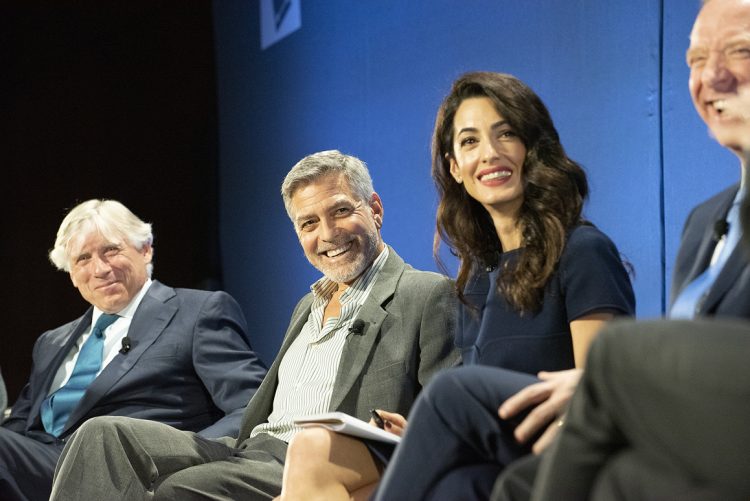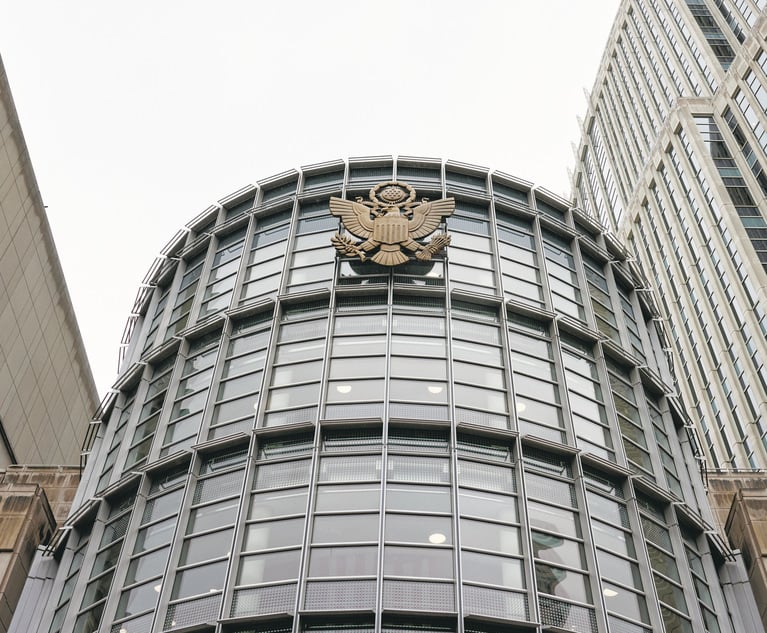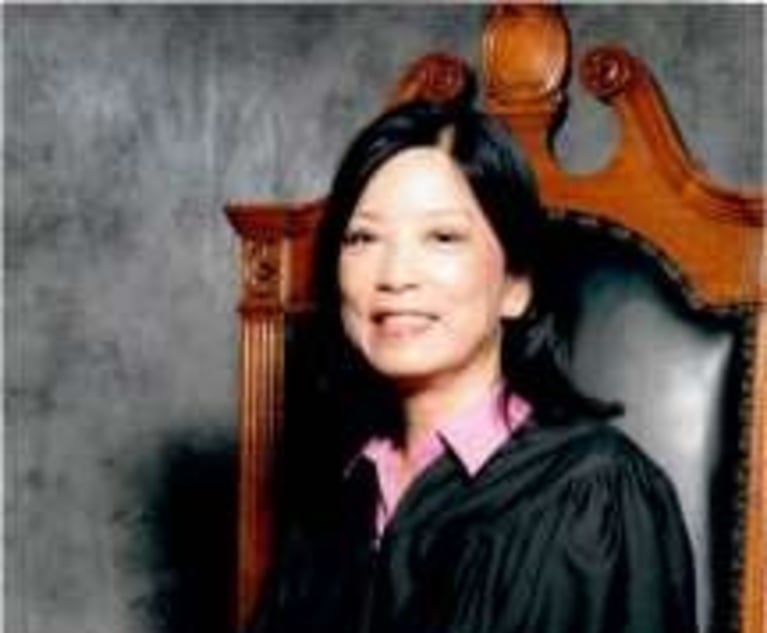In One of First Calls to Action, Clooneys' TrialWatch Asks for Release of Many Convicted at Equatorial Guinea Trial
TrialWatch and the ABA say that sentences imposed on the 112 convicted people at a corrupt mass trial range from three to 97 years, and that 20 defendants were given more than 70 years in prison.
June 10, 2019 at 11:46 AM
3 minute read
 Panelists at the TrialWatch launch event at Columbia Law School discuss the project. Pictured from left to right are Columbia University President Lee Bollinger, George Clooney, Amal Clooney and Microsoft President Brad Smith. Photo: Beatrice Moritz
Panelists at the TrialWatch launch event at Columbia Law School discuss the project. Pictured from left to right are Columbia University President Lee Bollinger, George Clooney, Amal Clooney and Microsoft President Brad Smith. Photo: Beatrice Moritz
Amal and George Clooney's TrialWatch global initiative, launched in New York in April, and the American Bar Association Center for Human Rights are calling for the release of many defendants convicted at a recent mass trial in Equatorial Guinea that focused on an alleged coup d'état and a presidential assassination attempt.
The two groups, which are partners under the umbrella of TrialWatch, say that many defendants were convicted without it being proved that they were connected to the alleged Equatorial Guinea government coup in 2017. (No exact number was given.)
In addition, the groups say that other defendants among the 112 convicted at a single trial in March should have their sentences reviewed by Equatoguinean authorities and, in turn, authorities should either commence proceedings that respect due process or release the defendants.
TrialWatch and the ABA say that sentences imposed on the 112 convicted people range from three to 97 years. Twenty defendants were given more than 70 years in prison, they say.
“From the outset, the trial was marred by egregious procedural irregularities, including the [Equatoguinean] President [Obiang Nguema Mbasogo]'s appointment of military judges and prosecutors by executive decree, and violated fair trial guarantees that are part of every state's obligations under international human rights law,” states a preliminary report on the trial prepared for the ABA and TrialWatch by Juan Mendez, former U.N. Special Rapporteur on Torture and Other Cruel, Inhuman or Degrading Treatment or Punishment and member of the Clooney Foundation for Justice's TrialWatch Expert Panel.
The report was hyperlinked in a news release issued by the Clooney Foundation for Justice last Thursday. It described trial violations and called for justice.
The trial, which handled the prosecutions of about 130 defendants, is among the first trials to be monitored and reported on by TrialWatch, according to spokeswoman Kylie McKenna.
The initiative, Amal Clooney's brainchild, seeks to scrutinize controversial criminal trials worldwide and publicize court-based instances of corruption and human rights violations while applying public pressure to governments, judges, officials and businesses that help support the abusive regimes.
The ABA's Center for Human Rights has monitored certain trials in the past for abuses and rights violations. By partnering with TrialWatch, it will be able to “expand its scope of work,” according to its website.
In April, at a TrialWatch launch event at Columbia Law School—another TrialWatch partner—Amal Clooney told a packed lecture hall that too often “we measure corruption by governments, but not courts,” even though many autocratic, authoritarian and other governments use judges and courts as a tool for silencing, abusing and scaring citizens.
Mendez, TrialWatch and the ABA relied on five TrialWatch international monitors who observed the little-publicized trial in Equatorial Guinea for information about it. The Clooney Foundation for Justice news release notes that “the number of accused and sentenced people is approximated because there were multiple inconsistencies between the prosecutor's various submissions listing the defendants and therefore is based on the monitor's notes.”
This content has been archived. It is available through our partners, LexisNexis® and Bloomberg Law.
To view this content, please continue to their sites.
Not a Lexis Subscriber?
Subscribe Now
Not a Bloomberg Law Subscriber?
Subscribe Now
NOT FOR REPRINT
© 2025 ALM Global, LLC, All Rights Reserved. Request academic re-use from www.copyright.com. All other uses, submit a request to [email protected]. For more information visit Asset & Logo Licensing.
You Might Like
View All
Haynes and Boone Expands in New York With 7-Lawyer Seward & Kissel Fund Finance, Securitization Team
3 minute read
Ticket-Fixing Scheme Results in Western NY Judge's Resignation—for a Second Time

Disbarred NY Atty Receives 54-Month Prison Sentence After $3M Embezzlement
3 minute read
Legal Community Mourns the Loss of Trailblazing Judge Dorothy Chin Brandt
Trending Stories
- 1DC Circuit Keeps Docs in Judge Newman's Misconduct Proceedings Sealed
- 2Litigators of the Week: US Soccer and MLS Fend Off Claims They Conspired to Scuttle Rival League’s Prospect
- 3Litigator of the Week Runners-Up and Shout-Outs
- 4U.S.- China Trade War: Lawyers and Clients Left 'Relying on the Governments to Sort This Out'
- 5Willkie Adds Five-Lawyer Team From Quinn Emanuel in Germany
Who Got The Work
J. Brugh Lower of Gibbons has entered an appearance for industrial equipment supplier Devco Corporation in a pending trademark infringement lawsuit. The suit, accusing the defendant of selling knock-off Graco products, was filed Dec. 18 in New Jersey District Court by Rivkin Radler on behalf of Graco Inc. and Graco Minnesota. The case, assigned to U.S. District Judge Zahid N. Quraishi, is 3:24-cv-11294, Graco Inc. et al v. Devco Corporation.
Who Got The Work
Rebecca Maller-Stein and Kent A. Yalowitz of Arnold & Porter Kaye Scholer have entered their appearances for Hanaco Venture Capital and its executives, Lior Prosor and David Frankel, in a pending securities lawsuit. The action, filed on Dec. 24 in New York Southern District Court by Zell, Aron & Co. on behalf of Goldeneye Advisors, accuses the defendants of negligently and fraudulently managing the plaintiff's $1 million investment. The case, assigned to U.S. District Judge Vernon S. Broderick, is 1:24-cv-09918, Goldeneye Advisors, LLC v. Hanaco Venture Capital, Ltd. et al.
Who Got The Work
Attorneys from A&O Shearman has stepped in as defense counsel for Toronto-Dominion Bank and other defendants in a pending securities class action. The suit, filed Dec. 11 in New York Southern District Court by Bleichmar Fonti & Auld, accuses the defendants of concealing the bank's 'pervasive' deficiencies in regards to its compliance with the Bank Secrecy Act and the quality of its anti-money laundering controls. The case, assigned to U.S. District Judge Arun Subramanian, is 1:24-cv-09445, Gonzalez v. The Toronto-Dominion Bank et al.
Who Got The Work
Crown Castle International, a Pennsylvania company providing shared communications infrastructure, has turned to Luke D. Wolf of Gordon Rees Scully Mansukhani to fend off a pending breach-of-contract lawsuit. The court action, filed Nov. 25 in Michigan Eastern District Court by Hooper Hathaway PC on behalf of The Town Residences LLC, accuses Crown Castle of failing to transfer approximately $30,000 in utility payments from T-Mobile in breach of a roof-top lease and assignment agreement. The case, assigned to U.S. District Judge Susan K. Declercq, is 2:24-cv-13131, The Town Residences LLC v. T-Mobile US, Inc. et al.
Who Got The Work
Wilfred P. Coronato and Daniel M. Schwartz of McCarter & English have stepped in as defense counsel to Electrolux Home Products Inc. in a pending product liability lawsuit. The court action, filed Nov. 26 in New York Eastern District Court by Poulos Lopiccolo PC and Nagel Rice LLP on behalf of David Stern, alleges that the defendant's refrigerators’ drawers and shelving repeatedly break and fall apart within months after purchase. The case, assigned to U.S. District Judge Joan M. Azrack, is 2:24-cv-08204, Stern v. Electrolux Home Products, Inc.
Featured Firms
Law Offices of Gary Martin Hays & Associates, P.C.
(470) 294-1674
Law Offices of Mark E. Salomone
(857) 444-6468
Smith & Hassler
(713) 739-1250






